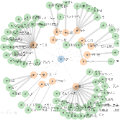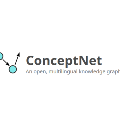Understanding users' intentions in e-commerce platforms requires commonsense knowledge. In this paper, we present FolkScope, an intention knowledge graph construction framework to reveal the structure of humans' minds about purchasing items. As commonsense knowledge is usually ineffable and not expressed explicitly, it is challenging to perform information extraction. Thus, we propose a new approach that leverages the generation power of large language models~(LLMs) and human-in-the-loop annotation to semi-automatically construct the knowledge graph. LLMs first generate intention assertions via e-commerce-specific prompts to explain shopping behaviors, where the intention can be an open reason or a predicate falling into one of 18 categories aligning with ConceptNet, e.g., IsA, MadeOf, UsedFor, etc. Then we annotate plausibility and typicality labels of sampled intentions as training data in order to populate human judgments to all automatic generations. Last, to structurize the assertions, we propose pattern mining and conceptualization to form more condensed and abstract knowledge. Extensive evaluations and studies demonstrate that our constructed knowledge graph can well model e-commerce knowledge and have many potential applications.
翻译:暂无翻译





